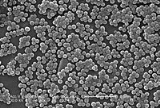
ST8:USA300
Encyclopedia
ST8:USA300 is a strain
of
community-associated MRSA
that has emerged as a particularly antibiotic resistant
epidemic that is responsible for rapidly progressive, fatal diseases including necrotizing pneumonia
, severe sepsis
and necrotizing fasciitis
. The epidemiology
of infections caused by MRSA is rapidly changing: in the past 10 years, infections caused by this organism have emerged in the community. The 2 MRSA clones in the United States most closely associated with community outbreaks, USA400 (MW2 strain, ST1 lineage) and USA300, often contain Panton-Valentine leukocidin
(PVL) genes and, more frequently, have been associated with skin and soft tissue infections. Outbreaks of community-associated (CA)-MRSA infections have been reported in correctional facilities, among athletic teams, among military recruits, in newborn nurseries, and among active homosexual
men. CA-MRSA infections now appear to be endemic in many urban regions and cause most MRSA infections.
Strain
Strain can refer to:* Strain , variants of plants, viruses or bacteria; or an inbred animal used for experimental purposes* Strain , a chemical stress of a molecule...
of
community-associated MRSA
Methicillin-resistant Staphylococcus aureus
Methicillin-resistant Staphylococcus aureus is a bacterium responsible for several difficult-to-treat infections in humans. It is also called multidrug-resistant Staphylococcus aureus and oxacillin-resistant Staphylococcus aureus...
that has emerged as a particularly antibiotic resistant
Antibiotic resistance
Antibiotic resistance is a type of drug resistance where a microorganism is able to survive exposure to an antibiotic. While a spontaneous or induced genetic mutation in bacteria may confer resistance to antimicrobial drugs, genes that confer resistance can be transferred between bacteria in a...
epidemic that is responsible for rapidly progressive, fatal diseases including necrotizing pneumonia
Pneumonia
Pneumonia is an inflammatory condition of the lung—especially affecting the microscopic air sacs —associated with fever, chest symptoms, and a lack of air space on a chest X-ray. Pneumonia is typically caused by an infection but there are a number of other causes...
, severe sepsis
Sepsis
Sepsis is a potentially deadly medical condition that is characterized by a whole-body inflammatory state and the presence of a known or suspected infection. The body may develop this inflammatory response by the immune system to microbes in the blood, urine, lungs, skin, or other tissues...
and necrotizing fasciitis
Necrotizing fasciitis
Necrotizing fasciitis , commonly known as flesh-eating disease or Flesh-eating bacteria syndrome, is a rare infection of the deeper layers of skin and subcutaneous tissues, easily spreading across the fascial plane within the subcutaneous tissue.Necrotizing fasciitis is a quickly progressing and...
. The epidemiology
Epidemiology
Epidemiology is the study of health-event, health-characteristic, or health-determinant patterns in a population. It is the cornerstone method of public health research, and helps inform policy decisions and evidence-based medicine by identifying risk factors for disease and targets for preventive...
of infections caused by MRSA is rapidly changing: in the past 10 years, infections caused by this organism have emerged in the community. The 2 MRSA clones in the United States most closely associated with community outbreaks, USA400 (MW2 strain, ST1 lineage) and USA300, often contain Panton-Valentine leukocidin
Panton-Valentine leukocidin
Panton-Valentine leukocidin is a cytotoxin—one of the β-pore-forming toxins. The presence of PVL is associated with increased virulence of certain strains of Staphylococcus aureus...
(PVL) genes and, more frequently, have been associated with skin and soft tissue infections. Outbreaks of community-associated (CA)-MRSA infections have been reported in correctional facilities, among athletic teams, among military recruits, in newborn nurseries, and among active homosexual
Homosexuality
Homosexuality is romantic or sexual attraction or behavior between members of the same sex or gender. As a sexual orientation, homosexuality refers to "an enduring pattern of or disposition to experience sexual, affectional, or romantic attractions" primarily or exclusively to people of the same...
men. CA-MRSA infections now appear to be endemic in many urban regions and cause most MRSA infections.

